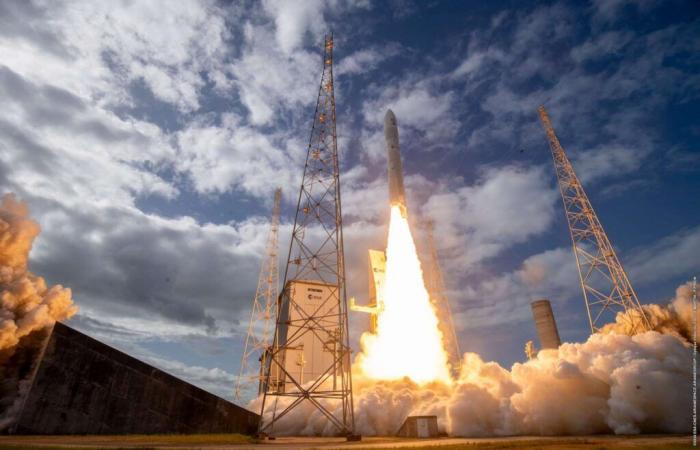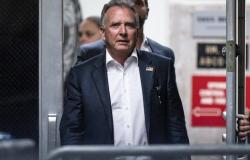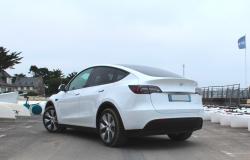Elon MuskElon Musk founded the company SpaceXSpaceX and transformed it into a true space empire. Few can claim to want to tickle this all-powerful power: China, Jeff Bezos. Europe? As things stand, no. We are not in the same world. So what choices remain? Independence? A patient comeback?
SpaceX is omnipresent in the space domain today. Of the first 10 flights of this year 2025, 8 were operated by SpaceX, launching a total of 112 satellites manufactured by the company, including 90 for its constellation StarlinkStarlink. In 2024, Europe had operated only 3 launches, and SpaceX had carried out 138, including 4 Starship tests.
“We are preparing for all scenarios”
During his greeting ceremony to the press on January 10, the director general ofEuropean Space AgencyEuropean Space Agency (ESA) was reassuring in the face of risks and threats regarding certain missions in cooperation with the United States. This is the case of Exomas. ESA built the Rosalind Franklin rover and relied on an international partner to develop the lander. After abandoning the Americans, the ESA turned to Russia, but the war in Ukraine abruptly ended cooperation. Since then, the mission has been in constant postponement.
The Moon is a “distraction” according to Elon Musk, who wants to concentrate all efforts on Mars. However, there is no question on the American side of abandoning the Artemis program. But it will undoubtedly be very refined in order to be able to channel more resources into Martian exploration. No more SLS after Artemis III? Could this therefore be a new hope for ExomarsExomars ? If so, will this be worth the end of cooperation between ESA and NASA on the spacecraft OrionOrion dedicated to Artemis missions if it is replaced by the Starship?
« We prepare for all scenarios », we are told at the ESA, which will have time to see more clearly about its future relationship with the United States of Trump-Musk before voting, in November, its next budgets and orientations at the ministerial conference from Bremen.
A policy of sovereignty undermined by the “reactionary international”
Ariane 6, VegaVega-C, autonomous access to space has been undermined over the past two years due to delays. It will soon be nothing more than a memory, but this difficult episode serves as a lesson to space Europe, which must be more agile so as not to lose its footing or its place. GalileoGalileo for navigation, Copernicus for imagery, GovSatCom and soon Iris² for communications and 5G5G secure from orbit: Europe can be proud to have all these programs, worthy of a leading space power.
The need for sovereignty predominates all the motivations behind these major programs. This also reflects the spirit of European space policy. Apart from a few hiccups, the bet paid off. Alliances of European powers via the EU and the ESA have made it possible to implement a program sufficient to guarantee independence.
Faced with the domination of Starlink, and the interference of Elon Musk in the Ukrainian conflict, the Iris² project will allow us not to depend on SpaceX. The problem: no commissioning before 2031, and that is a very long time, too long for some.
-The surprise came from Italy, currently led by far-right Prime Minister Georgia Meloni, who has shown a certain closeness to Musk in recent months. On January 5, Bloomberg reveals the negotiation of a $1.5 billion contract between Italy and SpaceX to use Starlink while Iris² becomes operational. Meloni has denied any signature, but it is a masterstroke for the billionaire, who is clearly seeking to redefine the European political vision, through interference in elections. The result is an unprecedented disruption in European unity, the sole guarantor of the Old Continent’s major space programs. So if European space sovereignty is undermined, can we have other claims?
Competitiveness: a pipe dream?
During an interview with journalists, organized by the AJPAE association, the CEO of ArianeGroup Martin Sion specified that five flights Ariane 6Ariane 6 are planned this year, with the first scheduled to take off no earlier than the end of February. Then, the increase in rate will gradually reach… nine or ten flights per year, i.e. the rate of flights Falcon 9Falcon 9 targeted by SpaceX in just three weeks. Only a high rate combined with reuse guarantees competitiveness today. Full success for SpaceX, which is also very available, while the Ariane 6 flight log is complete for the coming years.
To deploy its Kuiper satellite megaconstellation, AmazonAmazon booked 18 Ariane 6 flights, but it was more for a question of availability than for a reason of competitiveness. To deploy its satellites, Jeff BezosJeff Bezos needed launcherslaunchers in addition to the New Glenn from his company Blue Origin, and there was no question of flying aboard SpaceX. Fortunately, new launchers are about to arrive in Europe. There are around ten of them, including the Germans RFA and Isar Aerospace, the Spanish PLDSpace which recently revealed its plans to become a new SpaceX, or even the start-upstart-up French company Latitude and the ArianeGroup subsidiary Maiaspace. The arrival of these new launchers will reshuffle the cards for access to space in Europe, until now dictated by the ESA.
Beyond the launchers, theecosystemecosystem European space has benefited greatly from the vaguevague of business creation New SpaceNew Space. Today, some of them sell their satellite products or services beyond Europe, including in the United States. Companies that export to the United States will soon be at the heart of a trade war between Europe and the Americans, led by Donald Trump who threatens to radically increase tax duties at the border.
Quality beyond ambition
Let us all remember how European space is extremely reliable for eyeseyes Americans. It’s a rocketrocket Ariane 5 which deployed the télescope spatial James-Webbtélescope spatial James-Webb from NASA, costing no less than 10 billion dollars! The quality of the orbiting was such that we were able to double thelife expectancylife expectancy of the telescope. It is boosted by a European propulsion module that the Orion spacecraft will take the astronautsastronauts from NASA see the LuneLune. The quality of European space is such that we happily accept any partnership.
But, faced with Elon Musk’s ambitions, we must not rely on his laurelslaurels as Europe has done for too long. Will commercial space competition be enough to revitalize minds? Or will something more inspiring be needed? European space has always needed a challenge to stay at the top level!






